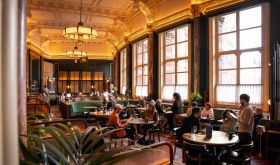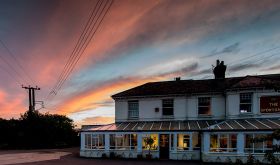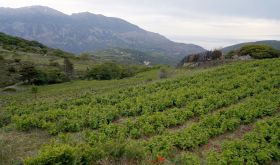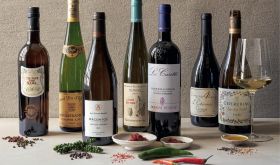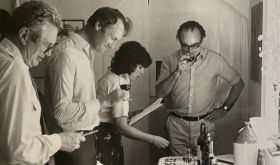April is the cruellest month, breeding
Lilacs out of the dead land, mixing
Memory and desire, stirring
Dull roots with spring rain.
Winter kept us warm, covering
Earth in forgetful snow, feeding
A little life with dried tubers.
T S Eliot, The Waste Land
May Day seems an appropriate day on which to say goodbye to another month that has been cruel to restaurateurs across the UK.
Not quite as cruel as the three-month period immediately beforehand but none too kind either. Restaurants in England were allowed to open on 12 April, but only to serve customers sitting outside. Those in Scotland, Wales and Northern Ireland were allowed this chilly concession only during the last week of April. And, as I wrote a fortnight ago, the COVID rules regarding outdoor seating are as cruel as life itself. Those with large outdoor terraces – even those with seating facing south and on to a busy road and a building site – have prospered, whereas those without may reopen fully only on Monday 17 May.
The weather since 12 April, while not devastatingly cruel, has been decidedly odd and even deceptive.
There has been very little rain in London all month. Other than yesterday morning there has been almost non-stop sunshine from dawn til dusk. And yet it has been cool, bordering on cold, for most of the time even if by the early afternoon the sun has threatened to burn the tops of any heads not completely covered with hair.
These were the conditions we experienced last Saturday lunchtime when we managed to get a booking at Caravan King’s Cross, familiar to attendees of our wine events, to celebrate HRH’s birthday en famille. The outlook from our table looked like an English seaside town but out of the sun it felt much cooler. I watched as the waiting staff seemed to almost run, their hands full of plates of hot food, to reach the numerous outdoor tables spread over more than twice their normal seating area outdoors. We ate and drank swiftly and decided to go for a walk to warm ourselves up.
When I thanked two of Caravan’s owners, Chris Ammermann and chef Miles Kirby, the next day I received an interesting reply. ‘Challenging’ was the word the former chose to use. I asked both of them for an explanation.
Miles was the first to reply.
‘I’m going to jump in and say the most challenging part has been just how busy it has been. I for one underestimated the speed at which things would return to almost pre-COVID sales levels, despite the restrictions on trading. Long may it continue.
‘Our entire team has been deployed and we are again on the hunt for more people. I hope some of the goodwill we have earned through our actions over the last year will reap some tangible benefits in the form of many great CVs coming through the door. I feel there are many businesses in a worse position than us, but recruitment is looking like a real challenge moving forward.
‘On the positive side, people are generally very happy to be out, less demanding and spending well.’
Chris added:
‘I have to completely agree with Miles’ comments. Although we knew there was pent-up demand and we could see this in the reservation book, we still underestimated just how busy we would be in the first two weeks.
‘The weather of course helped significantly. It has been cold but, critically, the rain has stayed away. Other challenges which you will know all too well in serving outdoor seating include the distance from kitchen and bar to the outside spaces is much further than in the inside dining room. It has been very cold outside, so there has been a focus on getting hot food and drinks out swiftly. We are even steaming our milk in coffee a few degrees hotter to accommodate the contrast in temperatures. The cold weather also means that dwell times are shorter, tables therefore turn quicker creating more work (but also more revenue).
‘Our teams have not been working for over four months, so they’re not match-fit. Think how long it takes a Premier League player to get match-fit after being injured for a long period. It takes both mind and body to get used to long hours on your feet in the kitchen or restaurant floor. It takes a while until the work becomes second nature or instinctive.
‘We kept 250 people on furlough through the entire pandemic and now they’re all back at work. We’re hiring more staff and, as Miles said, recruitment is already becoming a challenge. Luckily, we have an amazing team and culture which helps in this process. It takes time to train new staff properly and integrate them into our service style and “Caravan of Love” culture.
‘Finally, to echo what Miles said, the customers have been amazing. Everyone is so thrilled to be out dining at restaurants again and our team is so happy to be working again, doing what we love to do. We have all missed the human connection that brightens people’s lives. This has helped create a fantastic atmosphere at all of our restaurants. We know it will eventually start to subside but we’re enjoying this moment in time immensely and we always try to remain positive.’
May and the coming summer may prove to be even more cruel for British restaurateurs than even April, or the preceding three months have been, for one very important reason, touched on by Chris and Miles: the difficulty many will face in recruiting new staff as more and more restaurants reopen on 17 May.
My colleague Alice Hancock, the ‘serious leisure correspondent’ at the FT, highlighted this very subject in an article on 18 April and the subject has been picked up in today’s trade publication, Caterer.
It would appear that the lockdown, by closing so many restaurants, hid the fact of restaurant staff shortages rather as the virus, by dampening-down trade volumes in the first months of 2021, hid the real costs as well as the complexity of the Brexit decision. Now as so many restaurateurs seek to reopen, they find that many of their former staff have decided to leave the UK, the profession, or both.
Hancock quoted Phil Urban, the chief executive of Mitchells & Butlers, the UK’s largest FTSE-listed pub group. He estimated that about 9,000 of M&B’s 39,000 staff had left since the first lockdown last year, many to take other jobs in home delivery or essential retail, both of which have boomed during the pandemic.
Des Gunewardena, chief executive of D&D, owner of 38 restaurants in London, Manchester and Leeds, said he was planning a ‘rapid rebuild’ of the company’s workforce to cater for high demand. ‘Quite how much of a challenge that will be, with many EU staff having permanently left the UK, we don’t know, but I do think it will be tough’, he said.
But according to an article in The Economist published on 29 April, the UK may not be alone in this respect. ‘Earlier this month Bloomberg reported that Delta Air Lines had cancelled 100 flights for lack of workers. One café in Florida had turned to robots to greet customers and serve food because humans are so difficult to find. A branch of McDonald’s is paying potential burger-flippers $50 just to turn up for a job interview.’



